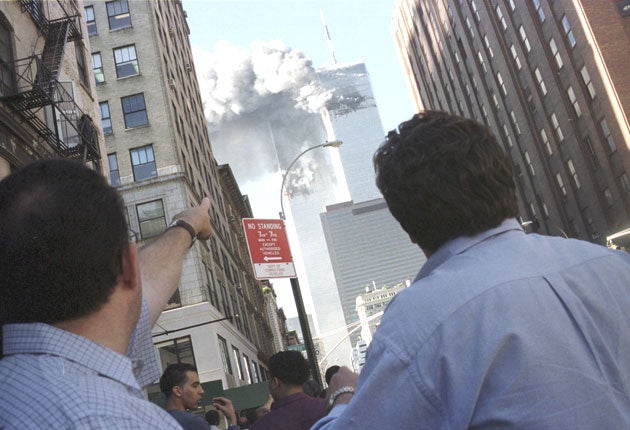Voices from that horrific day tell their own stories

The sheer bafflement of America's air traffic control network during the two hours of the attacks on 11 September 2001 was put on vivid display yesterday with the release of complete audiotape recordings of increasingly frantic communications as the crisis accelerated.
The tapes, which also carry the voices of commercial pilots, military aviation officials and fighter pilots, were originally meant as part of a comprehensive audio history of that day for consideration by the 9/11 Commission, but the panel disbanded before it was completed and the tapes have never been available in their near-entirety before (two sections of the tapes remain unheard – one carrying the cockpit recordings of United 93 in its last 30 minutes and another reportedly featuring a conference call between national leaders, including Mr Cheney and former Defence Secretary Donald Rumsfeld).
The tapes show air traffic controllers in the eastern US struggling to grasp what they were witnessing as, one-by-one, planes smashed into their intended targets or, in the case of United 93, into a Pennsylvania field.
They also confirm that civilian controllers had difficulty reaching military counterparts to get fighters into the air.
A civilian controller in New York is heard trying to alert a manager at the Federal Aviation Authority in Herndon, Virginia. "Do you know if anyone down there has done any coordination to scramble fighter-type airplanes?" he asks after the first tower has been hit. "We have several situations going, going on here. It is escalating big, big time and we need to get the military involved with us." A Herndon voice responds: "Why, what's going on?" "Just get me somebody who has the authority to get military in the air, now," the controller says.
The tapes were put together by the Rutgers University Law School with help from Miles Kara, a retired Army colonel and investigator for the 9/11 Commission. The often chilling results of their scholarship were posted on the university website and reported by the New York Times.
Some of the tapes have been heard publicly before, both at Commission hearings and in court cases related to the attacks.
But according to Mr Mara, the collection of recordings and transcripts, some of which he accessed at the National Archives, offer a wider view of what happened in the skies of the east coast that morning.
"The story of the day, of 9/11 itself, is best told in the voices of 9/11," he said.
The tapes remove any remaining doubt that assertions by the country's leaders in the aftermath of the attack, including then Vice-President Dick Cheney, about fighters being sent into the air promptly and shadowing the hijacked planes with orders to shoot them down if necessary, were not true.
Military commanders had nine minutes' notice before one of the planes hit its target, but no notice at all before the crashes of the other three.
Subscribe to Independent Premium to bookmark this article
Want to bookmark your favourite articles and stories to read or reference later? Start your Independent Premium subscription today.

Join our commenting forum
Join thought-provoking conversations, follow other Independent readers and see their replies
Comments